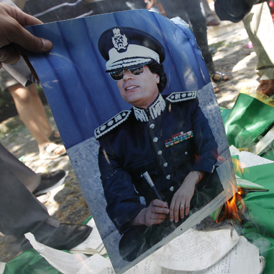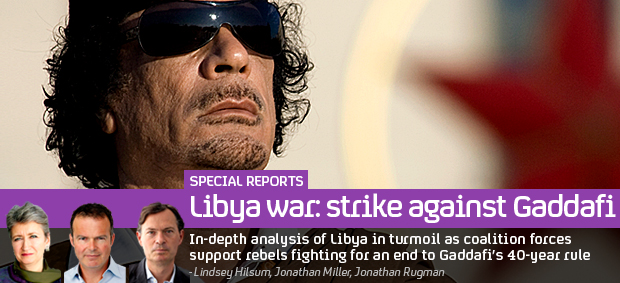Libya faces ‘difficult days’ warns Cameron
David Cameron says Libya faces “difficult days” following the rebel advance into Tripoli. The Prime Minister says there is no room for complacency as fighting rages in parts of the Libyan capital.

David Cameron has urged Colonel Muammar Gaddafi to stop fighting as the Libyan dictator’s regime was in “full retreat”.
His words have been echoed by UN Secretary General Ban Ki-Moon who called on forces loyal to Libyan leader Muammar Gaddafi to allow a transition to power in the war-torn country.
He added that all UN member states are obligated to comply with decisions of the International Criminal Court in The Hague, which has issued arrest warrants for Gaddafi, his son Saif al-Islam and his intelligence chief.
The Libyan rebels, who say they have captured Saif al-Islam and two other sons of Gaddafi, have indicated they might want to try the trio in Libya instead of handing them over the ICC.
Regime ‘falling apart’
After a meeting of the National Security Council on Libya, Prime Minister David Cameron said the latest information indicated “the vast majority” of Tripoli was now in rebels’ hands.
But there is still fierce fighting in pockets of the capital.
Forces loyal to Gaddafi have stationed tanks near his compound in central Tripoli and are resisting rebel attacks, a rebel official told Reuters.
“The situation is not stable. There is gunfire everywhere. Gaddafi’s forces are using tanks at the port and Al Sarine street near (Gaddafi’s compound at) Bab al-Aziziyah,” said the rebel official in Tripoli, who gave his name as Abdulrahman.
Read more: LIVE BLOG - Battle for Tripoli rages in Libya
While there was no confirmation of Gaddafi’s whereabouts, at least two of his sons had been detained, Mr Cameron said outside Number 10.
“His regime is falling apart and is in full retreat,” Mr Cameron said.
“Gaddafi must stop fighting, without conditions, and clearly show that he has given up any claim to control Libya.”
Mr Cameron went on: “The situation in Tripoli is clearly very fluid and there is absolutely no room for complacency.
“Our task now is to do all we can to support the will of the Libyan people which is for an effective transition to a free, democratic and inclusive Libya.
“This will be and must be and should be Libyan-led and a Libyan-owned process with broad international support co-ordinated by the United Nations.
“Clearly the immediate priority today is to establish security in Tripoli.”
The Prime Minister said the Government would establish a “diplomatic presence” in Tripoli as soon as it was safe to do so.
International reaction
The United Arab Emirates, which has been mostly silent during a six-month rebellion against Muammar Gaddafi, has congratulated Libyan rebels on their move into Tripoli.
“Sheikh Mohammed praised the wisdom shown by (rebel Transitional National Council chief) Mustafa Abdul Jalil when dealing with various developments in the Libyan front,” state news agency WAM said a statement, referring to Abu Dhabi Crown Prince Sheikh Mohammed bin Zayed.
In China and Russia, both powerful critics of the Nato offensive launched in March, officials agreed that Libya appeared to have new masters. In Beijing, the foreign ministry said it would respect the people’s choice.
South Africa, a leading power on the continent to which Gaddafi devoted much of Libya’s wealth and influence, denied it had sent a plane for Gaddafi or was planning to shelter a leader who has been indicted for crimes against humanity by the International Criminal Court in The Hague.
-
Latest news
-
Laughing Boy: New play tells the tragic tale of Connor Sparrowhawk5m

-
Sewage warning system allows some of worst test results to be left off rating system, analysis shows3m

-
Post Office inquiry: Former CEO didn’t like word “bugs” to refer to faulty IT system4m

-
Israeli soldier speaks out on war in Gaza12m

-
PM’s defence spending boost should be ‘celebrated’, says former Armed Forces Minister4m

-





